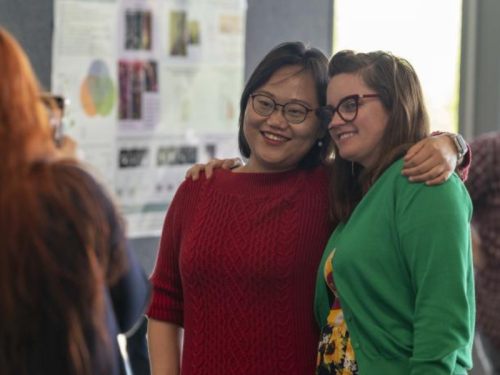Advancing Water Safety: Meet Huiyun Wu, Ph.D.

Huiyun Wu, Ph.D., a Postdoc fellow at the Tulane University School of Public Health & Tropical Medicine, recently received two Tulane Innovation Institute awards at the 2024 Tulane Research Innovation and Creativity Summit. Huiyun spoke with the Tulane Innovation Institute about her innovative research and experience at Tulane.
Huiyun, please tell us more about your research:
My research is focused on data-driven strategies for advancing water sustainability, molecular microbiology applications, and environmental microbiome investigation. In other words, I study the bugs in water that affect our health.
What would you like to accomplish with your research?
I want to provide a comprehensive understanding of the fate and transport of pathogens in water cycles. This includes developing novel microbial water quality indicators and Indigenous surrogates for microbial water quality and investigating microbial communities in water sites (environmental, recreational, or drinking water) and their interactions with drivers such as climate change and anthropologic effects. The dream outcome is that we can prevent or reduce the transmission of waterborne disease based on our assessment of the pathogens in the water.
Congratulations on your recent achievements, the TRICS Innovation and Societal Impact Award (1st place), and the honorable mention for The TRICS Innovation and Technology Development Award from the Tulane Innovation Institute. Tell us more about how your research relates to these accolades:
I am very honored to have been awarded two awards by TRICS! It greatly encourages me to continue advancing my research in microbial water quality. I cannot express how much I value these recognitions, as they show that our work and ideas are acknowledged and supported for their positive impact on society and technology development. My research is to advance technology to be applied in water safety to reliably assess microbial water quality to prevent and reduce waterborne diseases. I applied the open-science concept and developed a reproducible research workflow, which includes standard operation procedures (SOPs) and an open-source metagenomic data analysis pipeline. We found a near complete virus genome that belongs to a tomato brown rugose fruit virus from the treated wastewater, and this virus can serve as a novel microbial water quality indicator for water safety. We can use it to evaluate its association with pathogens and assess the microbial contamination in our communities.
How has the Tulane School of Public Health & Tropical Medicine (SPHTM) helped you with your research?
Previously trained as an environmental engineer, I was immersed in a rich research environment that addresses health effects and public health issues at the SPHTM. I met great people dedicated to conducting high-quality research and was exposed to novel technologies and concepts in environmental health sciences. Most importantly, I was free to enhance my data science skills for bioinformatics through various tutorials provided by Tulane and Tulane's collaborators. I am very grateful for my experience at the SPHTM.
Do you currently have any mentors you would like to acknowledge?
I would like to acknowledge my department chair, Dr. Melissa Gonzales, a strong female scientist and leader, for being my role model. I learned a lot from her dedication to addressing female empowerment in our field and her encouragement to develop a daily writing routine. I also want to acknowledge my lab partner, Dr. Kate Vigil, for her commitment to reproducible research and my supervisor, Dr. Tiong Aw, for providing me with the platform to conduct the water research I am passionate about.
What challenges have you faced as a researcher?
I was born and raised in China and had to conquer the language and culture barrier before becoming a researcher. Reading and writing in academia were big challenges for an international scholar. I also had to learn how to organize my research materials to develop and tell a story for my research, which took years of training.
What advice do you have for researchers who are new to Tulane?
There are so many wonderful people in this community. Please reach out and introduce yourself and your research! You will get inspired and motivated. The Tulane Innovation Institute is a great place to start!
Original article here.
